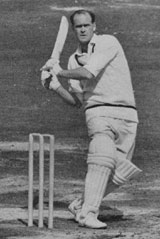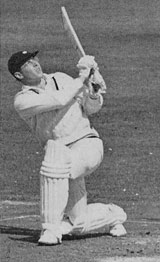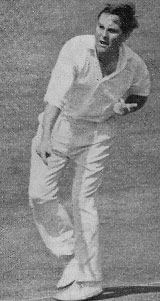Who got Boycott biffing?
One-day cricket
was still new and
the Gillette Cup in
its third year when
Yorkshire met Surrey
in the 1965 final. It
proved one of the
competition's more
memorable games.
Geoff Boycott, without
a hundred all season,
hit 146 with three
sixes and 15 fours.
Everyone wanted the
credit, even Micky
Stewart, for putting
Yorkshire in
|
|

|
Brian Close (Yorkshire captain):
We were a fine county side in those
days. Illy, myself, Boycs and Fred
Trueman. Jimmy Binks behind the
stumps. I tell you, we'd take on this
England side and beat them inside
four days.
Ray Illingworth (Yorkshire):
It was a wet morning and a late start but
the wicket was OK. There was
dampness in the air and the game
was delayed for more than an hour.
Close: In 1965, the Championship was out of reach. It was a very wet summer and we hardly finished a game until June. So we applied ourselves to this new competition. We were a good attacking side. We knew how to get people out. But I always felt that one-day cricket reversed the principles of first-class cricket where the bowlers and fielders ask the questions of the batsman and he tries to answer them. In one-day cricket the bowler's running up wondering what's going to happen to the next ball.
Micky Stewart (Surrey captain):
I won the toss and put them in. It
turned out to be the sort of decision
that earns you the freedom of
Bradford and Leeds. If you looked at
the two sides, I think nearly all of
theirs had played for England. We
were much more inexperienced
and some of our lads were a bit
nervous, so I thought we may as
well get out there and field first.
It seemed to be a good decision. The Yorkshire openers, Boycott and Ken Taylor made a slow start and, when Taylor was out, the score was 22 from 12 overs.
Ken Taylor (Yorkshire):
It was a slow wicket and I tried to cut. All I ended
up doing was giving an easy catch to
Ken Barrington in the gully. It was
like an underarm throw.
Taylor's dismissal brought Close to
the wicket. Some remember it as a
spontaneous tactical decision to
accelerate the scoring. Others
disagree.
Illingworth:
There's been a lot of talk about Closey going in early to
tell Boycott to get on with it but it
wasn't to give Boycs a bollocking or
owt like that. It was all about the
Surrey left-armer, David Sydenham.
Close:
Boycott didn't like the left-arm
over bowlers so much.
Illingworth:
We'd recently played
Surrey in the County Championship
and Sydenham had bowled very well
to the right-handers. So Jimmy Binks
had said to me: "In the final why
don't you tell Closey [a left-hander]
to go in up the order?"
Close:
Doug Padgett was due to go in at three but he looked at the score
and said to me: "Look, skip, you better go in next. It's suited to you
is this. Anyway, if I bat with Boycs, he always ends up bloody well
running me out."
|
|

|
Geoffrey Boycott (from Boycott:
The Autobiography):
The suggestion is, of course, that I was piddling
along until Close arrived and told
me to get on with it or else, thus
forcing me to play a memorable
innings, which would not have
been possible without his rugged
intervention. It makes for good
reading but it is not the way I
remember it at all.
Close:
I joined Geoffrey in the
middle and said to him: "Listen, if
I call, you bloody well run."
Boycott:
At no time did Close tell
me to get on with it or anything
remotely similar. Those who
believe otherwise are mistaken.
Illingworth:
The players used to
use me to get messages through to
Brian. If you told the skipper
"you're the man for the job", it
would appeal to him.
Boycott:
It was no last-minute
inspiration. We had struggled
before against Sydenham. It was
obvious that he would be a real
nuisance in a limited-overs game,
especially to the right-handed
batsmen - and Close was the only
recognised batsman in the team
who was left-handed ... the plan
was formulated at least a fortnight
before the final.
Close:
We ran a few quick singles
and turned the scoreboard over
and I went back down and said: "If
it pitches up, give it a bloody belt."
Geoff Arnold bowled the next ball
a fraction full and Boycs thrashed
him through extra cover. He'd
never played a shot like it.
Stewart: Boycs was great. We knew he played well square off the back- foot and front-foot, so I said: "Look, don't bowl him any Father Christmas deliveries there." But instead of getting it in the blockhole we gave him plenty of half-volleys, then adjusted to long hops. He dealt with them very well.
Close:
Then the off-spinner came
on. Usually Boycs was frightened
of hitting the slower lads in the air
for fear of getting caught but I told
him: "Just hit it anywhere from
square leg to mid-off."
Taylor:
He batted beautifully. It
just proved what he could do. So
there was no reason why he
couldn't have continued like that.
But it must have frightened him to
death thinking that he had to play
like that every innings.
Boycott:
I still remember moving
down the pitch to Geoff Arnold
and lifting him straight for six
with the Yorkshire players trying
to catch the ball on the pavilion
balcony.
Close and Boycott added 194 for the second wicket. John Woodcock wrote in The Times: "I shall never again make it an excuse for Boycott that he is unfortunately not endowed with strokes. His magnificent innings contained every stroke in the book."
Close:
It was a great innings -
chanceless. And I think it was the
highest one-day score at the time.
With some late hitting from Fred Trueman and Jackie Hampshire, Yorkshire ended up with 317 from their 60 overs, then the competition's highest total.
Stewart:
In those days it was an
absolutely huge total. I mean in a
first-class game if you declared and
asked a side to chase anything over
four an over, it was thought of as
unrealistic.
Illingworth:
We got a massive
score, even by today's standards,
and of course there were no
restrictions, so they could put the
fielders where they liked.
|
|

|
Stewart:
When I walked out to bat,
with us needing five an over from
the off, Kenny Barrington said to
me with a smile: "What are the
tactics skip?" As it happened Fred
Trueman ended the match in one
over, taking three wickets.
In four balls Trueman had John Edrich caught, Bill Smith leg-before and Ken Barrington caught behind. "The writing was on the wall," noted Wisden. Illingworth also bowled well.
Illingworth:
Five for 20-odd in 12
overs and still not man of the
match? That showed that Boycs
had batted well. I remember
I got two or three with the arm
ball. No one could read it and it
was swinging like a banana.
Close:
Illy was a wise old sod. They
tried to have a dip at him and he
mixed up his offbreaks with the
arm ball.
Yorkshire had beaten Surrey by 175 runs and won the Cup. Doug Insole, the chairman of the England selectors, who had dropped Boycott from the Test side, presented him with the Man-of-the-Match award.
Boycott: It was one of the best innings I ever played, different in character from many that people choose to remember, but with a context and a significance all of its own.
Illingworth:
Boycott always had
lots of talent but I think he was
frightened of failure. He didn't
usually want to take chances. I
think he may well say that the best
he ever batted was on the Ashes
tour of 1970-71 when I was captain
because I gave him a lot of
encouragement.
Stewart:
Boycott played magnificently. There was a lot to
hit but he did it very well.
Close:
It was a thrill to be there. We enjoyed the day because when we
won Championship matches they
were always hard-fought. No one
ever declared and gave us anything
to chase. Each match presents its
own way of challenging you.
Illingworth:
Boycott had the
opposite mentality to batsmen
such as Ted Dexter and Peter May.
If he had thought like them, he
would have played more innings
like the one we saw that day.
Close:
We were all thrilled for
Boycs. It was one hell of an innings,
no messing.
